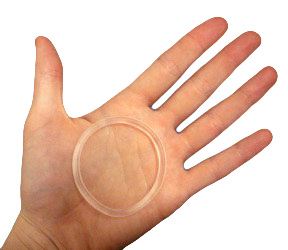NuvaRing: Pros and Cons
With so many contraceptives available, finding the right one for you can be overwhelming. It’s important to discuss your options with your doctor.
One such option is the NuvaRing - a small, plastic ring which is inserted into the vagina. Whilst there, it secretes hormones which are absorbed through the vaginal walls. The hormones help to regulate the menstrual cycle and mitigate the risk of pregnancy.

Your doctor will be able to help you make an informed decision on which contraceptive is the most suitable for you, based on yours and your family’s history, and discuss your individual risks.
Here, we will discuss the pros and cons of the contraceptive ring – also known as NuvaRing. Please understand that this does not replace speaking to your doctor one-to-one about your contraception.
What Are the Benefits of the NuvaRing?
No need to take a pill every day
Unlike the contraceptive pill, you don't need to remember to insert the NuvaRing every day. Once you insert a NuvaRing, you can forget about it for 3 weeks, before you need to remove it. The hormones of NuvaRing will continue working, even during your ring-free break.
Up to 99% effective
When used correctly, the NuvaRing is up to 99% effective at preventing unwanted pregnancy. This makes the vaginal ring one of the safest contraceptive methods available. Moreover, the contraceptive ring can be used in conjunction with condoms, which not only provide protection against unwanted pregnancy but also protect you and your partner from sexually transmitted infections (STIs).
Reduce cramps and acne
The hormones used in the contraceptive ring can help reduce the severity of period cramps and reduce the appearance of acne.
Helps to regulate periods
The contraceptive ring can regulate periods and make them lighter and, as discussed previously, less painful. When you remove the contraceptive ring, you should experience bleeding during the 4th week.
Reversible
If you are using NuvaRing to prevent pregnancy, but wish to start a family, you can stop taking NuvaRing and try for a baby shortly after. You should be able to become pregnant after completing a cycle with the ring.
What are the disadvantages of the NuvaRing?
Needs to be inserted every 3 weeks.
While you don't need to remember to use the NuvaRing every day, you still need to remember to remove the ring and insert a new one once a month.
If you often forget when to take medicine, set a reminder on your phone or smart home device so that you know when to change your NuvaRing.
 Might not be suitable for you
Might not be suitable for you
As with every medicine, NuvaRing may not be suitable for you.
As there is an increased risk of cardiovascular side effects when using the NuvaRing, it is not advised for people with circulatory diseases or illnesses to use the contraceptive ring.
It is important that, before you buy NuvaRing, you discuss the medicine with your doctor to ensure that it is safe for you to take. It's also vital to remain vigilant of side effects and changes to your body while using NuvaRing.
If you have any concerns, or experience any side effects, you should mention them to your healthcare provider.
Can be affected by some medicines
The contraceptive ring can be affected by some medicines, such as antibiotics, antifungals and other medications. For this reason, it is important that you speak to your doctor before choosing the NuvaRing as your method of contraception.
You should mention to your doctor all the medicines you take, including those on prescription and bought over-the-counter, including health and herbal supplements. Your doctor may advise you to stop taking medicines or may prescribe a suitable alternative.
Do not stop taking medicine unless your doctor has told you to.
NuvaRing can fall out
Unlike contraceptive pills, which are swallowed and absorbed by the body, the NuvaRing remains inside vagina.
However, sexual activity, straining on the toilet or removing tampons can cause the NuvaRing to fall out.
Instructions on what to do if your NuvaRing falls out can be found within the patient information leaflet supplied with your medicine.
If your NuvaRing keeps falling out, you should speak to your doctor about alternative contraceptive methods.
Does not protect against STIs
The NuvaRing does not create a barrier between bodily fluids and therefore does not protect you against any sexually transmitted infections (STIs) such as chlamydia or HIV.
It is generally recommended for users of the NuvaRing who are concerned about STIs to use the contraceptive ring alongside condoms, for additional protection against unwanted pregnancies and STIs.
As with all medicines, the NuvaRing carries risks and, for this reason, it is important for those who are seeking to use the contraceptive ring to contact their doctor. Your doctor will be able to discuss the right method of contraception with you and give you more information about which option is best for your needs.
While NuvaRing is effective at preventing pregnancy, it does not guarantee that you will not become pregnant, especially if you do not use the NuvaRing effectively. If you become pregnant while using NuvaRing, you should stop using NuvaRing and speak to your doctor as soon as possible.
References:
NHS, 2018. Vaginal Ring: Your Contraception Guide.
NuvaRing, 2020. NuvaRing website.
Merck Sharp & Dohme, 2020. Nuvaring patient information leaflet (PIL).
JME Rouman, 2008. Review of the combined contraceptive vaginal ring, NuvaRing
© 2013 - 2025 Al Muhsineen Limited. All Rights Reserved. Registered Pharmacy: 34 Halliwell Road, Bolton BL1 8RL. Registered Office: 254 First Floor, Shearbrow, Blackburn, England, BB1 8DS





